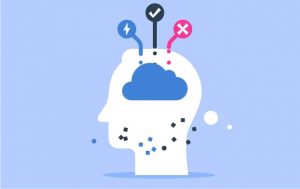AI or Behavior Science: They’re Different and One is Better
Over the past decade or so, the use of AI (or artificial intelligence) has become integrated into our lives in the form of shopping recommendations or predictive text, supporting interactions with one another. Increased use of AI has helped to speed up many of the things we do by guessing future behavior based on past behavioral data.  While AI has become commonplace in products like Amazon Echo and Google Maps, the use of behavior science (BS) has also expanded to more areas of daily life.
While AI has become commonplace in products like Amazon Echo and Google Maps, the use of behavior science (BS) has also expanded to more areas of daily life.
Behavior science offers a more complex and complete view of human interactions, incorporating elements such as mental, physical, emotional, financial, psychological drivers to help motivate and persuade humans toward certain behaviors. Behavior science helps to move its users toward an action by presenting information that drives them toward a certain action.
The use of AI and behavior science offer significant advantages and continue to evolve in new applications every day. But in terms of health and its applications toward improving patient health, is there a better choice?
What is Behavior Science? Behavioral science is the study of how human behavior impacts personal thoughts, decisions, interactions, and actions. By gaining a deeper understanding of human behavior, companies and organizations can use this output as a powerful tool to influence people’s health choices. Behavior science also includes elements of sociology, human culture, psychology, and the impact of behavior on elements of finances, housing, law, ethics, and politics.
How is BS used in digital health? Behavioral scientists study many types of health issues across various patient populations and analyze trends among these populations that could impact future health decisions. Many digital health companies use behavioral science-based interventions for users in areas such as dieting, diabetes management, medication maintenance, and fitness to nudge and drive patients toward more positive health actions and reduce future health risks.
How does BS compare to AI? AI is often used to improve applications by presenting a digital response to an input. For example, a user is recording their next meal will be pizza, and this exceeds their daily caloric intake. AI can use this info to suggest an alternative meal that aligns with the inputted goals. Essentially, it uses data inputs to create suggestions for actions that support the desired goal.
The use of BS can help customize the “reward” or motivation toward each user, creating a more specific interaction based on social, economic, psychological, or other behavioral factors. In this case, BS can see the choice of pizza for dinner, and then provide context around the dietary content of the pizza, show a recipe for a three-ingredient dinner under 500 calories, and present the user with images of healthy and delicious dinner ideas. Essentially, BS can respond to the emotional aspects of data, and connect with users on a deeper level.
Can both AI and BS can work together? Behavioral science solutions that incorporate AI can better predict what interventions will work most effectively and for whom. AI can also create personalized nudges to better scale over large populations. These personalized nudges could predict which messages will be the most salient to specific individuals, such as personalized health recommendations based on a unique genetic makeup, or incentivizing health behaviors based on shopping history.
Behavioral science can provide strategies to overcome barriers and biases patients encounter in their health journeys, which can be paired with AI to tailor messaging to an individual’s responses over time. Platforms like Lirio and Medisafe deliver interventions and optimized communication for each patient to engage and activate each user, based on data sets from thousands of patients with similar and dissimilar profiles.
What the future holds for digital health? Understanding how people communicate, receive information, and make decisions is central to creating a responsive and tailored digital health experience. This is where AI truly shines and helps to advance the usefulness of digital health tools. By incorporating behavioral science components that allow for changes in life stage, environment, and health status, a digital health companion can move from a helpful tool to an essential component in patient care.
Through greater refinement of its processes and deeper understanding of patient actions, digital health can use its predictive nature to alert users to prospective health crises. Digital health can then deploy specific behavioral health strategies for each patient to navigate toward healthier actions. In the very near term, we are likely to see behavior science and AI working in tandem to employ personalized health strategies that are informed by population data, rooted in a holistic approach that meets patients where they are, and moves them toward better health. The future of better, more personalized health support is likely just around the corner.
